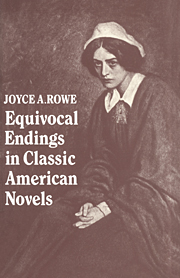 Equivocal Endings in Classic American Novels
Equivocal Endings in Classic American Novels Book contents
- Frontmatter
- Contents
- Acknowledgments
- Introduction
- 1 Nathaniel Hawthorne: “My Kinsman, Major Molineux”: The Several Voices of Independence
- 2 Bleak Dreams: Restriction and Aspiration in The Scarlet Letter
- 3 Mark Twain's Great Evasion: Adventures of Huckleberry Finn
- 4 Strether Unbound: The Selective Vision of Henry James's Ambassador
- 5 Closing the Circle: The Great Gatsby
- Conclusion: Moby-Dick and Our Problem with History
- Notes
- Index
- Frontmatter
- Contents
- Acknowledgments
- Introduction
- 1 Nathaniel Hawthorne: “My Kinsman, Major Molineux”: The Several Voices of Independence
- 2 Bleak Dreams: Restriction and Aspiration in The Scarlet Letter
- 3 Mark Twain's Great Evasion: Adventures of Huckleberry Finn
- 4 Strether Unbound: The Selective Vision of Henry James's Ambassador
- 5 Closing the Circle: The Great Gatsby
- Conclusion: Moby-Dick and Our Problem with History
- Notes
- Index
Summary
To the passionate reader, the ending of a good story is a mixed blessing. For though we demand endings to confirm or complete our sense of relations within a story and so make a work fully signify, an ending, like its real life counterpart, also entails a sense of loss, of emptiness – a little death, as it were. In this sense, fictional endings, whatever their ostensible resolution, are inherently equivocal. In fulfilling our desire for a world of “charged meanings” and singular events they recapitulate the wisdom of Prospero – reminding us that the meaning we seek is a vision we impose; that our finest aspirations are generated from the “baseless [and varied] fabric” of our dreams.
Shakespeare's The Tempest is associated with the Elizabethan voyages to the New World and the utopian ideals rekindled by its discovery. But when Prospero breaks his staff, resigns his powers, and returns to the world of the Renaissance state, he confirms his audience (and their English descendants) in a more restrictive sense of human possibility, and reality, than that which their American cousins were to evolve on their side of the Atlantic ocean. For despite cross-currents and interpenetrating influences between the two continents, by the mid-nineteenth century when, it is generally recognized, American writers had found their own style and voice, their formal as well as thematic concerns were generating a decidedly different literature from that produced by comparable writers abroad.
Nowhere, perhaps, is this more evident than in the pattern of the endings of classic American novels and their troubling relation to the narrative which precedes them.
- Type
- Chapter
- Information
- Equivocal Endings in Classic American NovelsThe Scarlet Letter; Adventures of Huckleberry Finn; The Ambassadors; The Great Gatsby, pp. 1 - 13Publisher: Cambridge University PressPrint publication year: 1988


